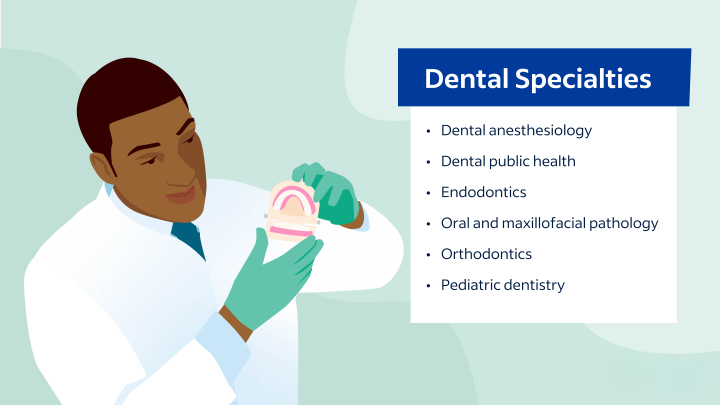
Dental Specialization After BDS
There are several types of dental specializations that dentists can pursue after completing their Bachelor of Dental Science (BDS) degree. Each specialization focuses on a specific area of dental care, allowing practitioners to gain expertise and provide specialized treatments. Here are the main types of dental specializations:
Click here to know more.
1. Orthodontics
- Focus: Correction of misaligned teeth and jaws (e.g., braces, aligners).
- Key Treatments: Braces, clear aligners (e.g., Invisalign), retainers, and other devices for teeth alignment.
2. Endodontics
- Focus: Diagnosis and treatment of diseases related to the dental pulp and root canals.
- Key Treatments: Root canal therapy, treatment of dental trauma, and endodontic surgery.
3. Periodontics
- Focus: Prevention, diagnosis, and treatment of gum diseases and conditions affecting the supporting structures of teeth.
- Key Treatments: Scaling and root planing, periodontal surgery, and implant placement.
4. Prosthodontics
- Focus: Restoration and replacement of teeth with artificial devices.
- Key Treatments: Crowns, bridges, dentures, veneers, and dental implants.
5. Oral and Maxillofacial Surgery
- Focus: Surgical treatment of diseases, injuries, and defects of the mouth, jaw, and face.
- Key Treatments: Tooth extractions, jaw surgery, treatment of facial trauma, and corrective jaw surgery.
6. Pediatric Dentistry (Pedodontics)
- Focus: Dental care for infants, children, and adolescents, including those with special needs.
- Key Treatments: Preventive care, fluoride treatments, dental sealants, and early orthodontic assessments.
7. Oral Medicine and Radiology
- Focus: Diagnosis and management of complex oral diseases and conditions, often using radiographic imaging.
- Key Treatments: Oral cancer screenings, TMJ disorder management, and interpretation of dental radiographs.
8. Public Health Dentistry
- Focus: Promoting oral health and preventing dental diseases at the community or population level.
- Key Activities: Community dental health programs, dental health education, and research on public health issues.
9. Oral Pathology
- Focus: Study, diagnosis, and research of diseases affecting the oral and maxillofacial regions.
- Key Activities: Laboratory-based examination of biopsies, research, and collaboration with other healthcare providers for diagnosis.
10. Forensic Odontology
- Focus: Application of dental knowledge in legal investigations, including the identification of human remains.
- Key Activities: Dental identification, age estimation, and bite mark analysis.
11. Cosmetic Dentistry
- Focus: Aesthetic improvement of teeth, gums, and smiles.
- Key Treatments: Teeth whitening, veneers, bonding, gum contouring, and smile makeovers.
12. Implantology
- Focus: Placement and maintenance of dental implants to replace missing teeth.
- Key Treatments: Dental implant surgery, bone grafting, and implant-supported prosthetics.
Each of these specializations requires additional education and training beyond the general dental degree, often in the form of a Master of Dental Surgery (MDS) or equivalent certification programs. Specializing allows dentists to focus their practice on specific areas of interest and provide expert care in their chosen field.